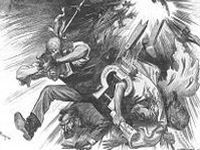On the failures of western internationalism
Why do western cultures, not least the western left, fail to understand and effectively engage with peoples of the former colonies? Why is pseudo-respect paid to - but nothing really learned from - indigenous cultures? Why has western interest in and support for the progressive states in Latin America been so weak?

By Tim Anderson
Many in intellectual circles, as well as anarchists, are more inclined to back utopian movements, such as the Zapatistas. And why do western left groups side almost instinctively with almost any sort of criticism of independent governments, even when this is driven or backed by the imperial powers?
I am thinking of the 'human rights' criticisms of Cuba and Venezuela, the 'non-extractive' criticisms of progressive governments in Bolivia and Ecuador and the sectarian Islamist attacks on Libya and Syria. I suggest we might see three elements in this failure: an educational-informational deficit, chauvinistic versus emancipatory nationalism and a basic ethical failure.
1. Educational-informational deficit
Western populations, despite their high levels of formal education, are trained to see the world in modernist models, depreciating histories. They imagine we can understand the reality of other cultures based on self-referential principle, and that the actual historical experience and conceptual thought of other cultures does not really matter. On top of this, and although we westerners are wired into international debates, these are debates heavily moderated by powerful states and media monopolies. The narrow scope of such debates is often not recognised because, as Noam Chomksy says, media gatekeepers 'strictly limit the spectrum of acceptable opinion, but allow very lively debate within that spectrum'. Western leftists often rely on the 'liberal' western corporate media. Yet these media monopolies severely limit the range of information and debate on the most important strategic issues. Western modernism, including much of western Marxism, builds poor understandings of other cultures, based on these self-referential models.
2. Chauvinistic versus emancipatory nationalism
Secondly, critical western thought often associates nationalism with chauvinism and even fascism, with some reason. Imperial cultures use nationalism for chauvinistic purposes. Similarly, western leftists more often see the state as 'captured' by powerful interests, and incapable of vindicating ordinary people in the face of those same powerful groups. Little or no hope is seen in the western state, which has been 'captured' by elites for centuries. By contrast, the former colonies ('developing countries' or the post-colonial nation-states) have mostly built their nationalism through projects of liberation from imperial domination.
(The North American 'revolution' was distinct, being led by slave owners and entrenching slavery and privilege, in the language of freedom.) Of course it is true that post-colonial independence was often compromised by, as the late Hastings Okoth-Ogendo put it, leaders who 'wanted to step into the shoes of the colonists'. Nevertheless, hope was not crushed in these new nations, and post-colonial patriotism more often means solidarity and independence, rather than chauvinism. It is no coincidence that western cultures, in recent centuries, have not seen a Ho Chi Minh, a Mao Tse Tung, a Gamel Abdul Nasser, a Fidel Castro, a Che Guevara, a Salvador Allende, a Julius Nyerere, a Nelson Mandela or a Hugo Chavez.
Initiatives led by such people have kept alive, in 'the south', the hope that the nation-state could overcome privilege and empower ordinary people. All such leaders came from anti-imperial struggles; against western colonial or neo-colonial domination. However, much of western modernist thought, model-bound and self-referential, tends to think that all nationalism and all states must be as dysfunctional for other cultures as they have become in their own. There is 'one size fits all' liberalism and there is 'one size fits all' leftism.
3. Ethical failure
Finally there is an ethical failure in the western 'voice', oblivious to the colonial legacy. The problems of others are seen as 'our' problems and we, the disinterested saviours, are going to solve them. It is asked, for example: what are 'we' going to do about Nigeria, or Somalia? Or how can we tolerate 'dictatorships' in Venezuela, Libya or Syria? The recent imperial doctrines of 'humanitarian intervention' and the 'responsibility to protect' make good use of this vulnerability amongst the western left, drawing on an educational-informational deficit. Yet the self-determination of peoples is a relatively simple ethical matter, rooted in international law (the UN Charter), asserted in the Declaration of Decolonisation (of 1960) and enshrined in the international covenants on Human Rights (1966). No matter.
Western arrogance pretends a responsibility that it neither understands nor is capable of delivering. We do not appreciate, it seems, that outsiders are categorically irresponsible, because they typically make demands, intervene and then walk away from the consequences. They can talk democracy but are almost never held accountable for their interventions. This is a problem which also pervades the multi-billion dollar aid industry - we will fix other peoples' problems, even saving them from themselves. That is not too far from the colonial era.
These are just some ideas, for consideration.
Subscribe to Pravda.Ru Telegram channel, Facebook, RSS!



